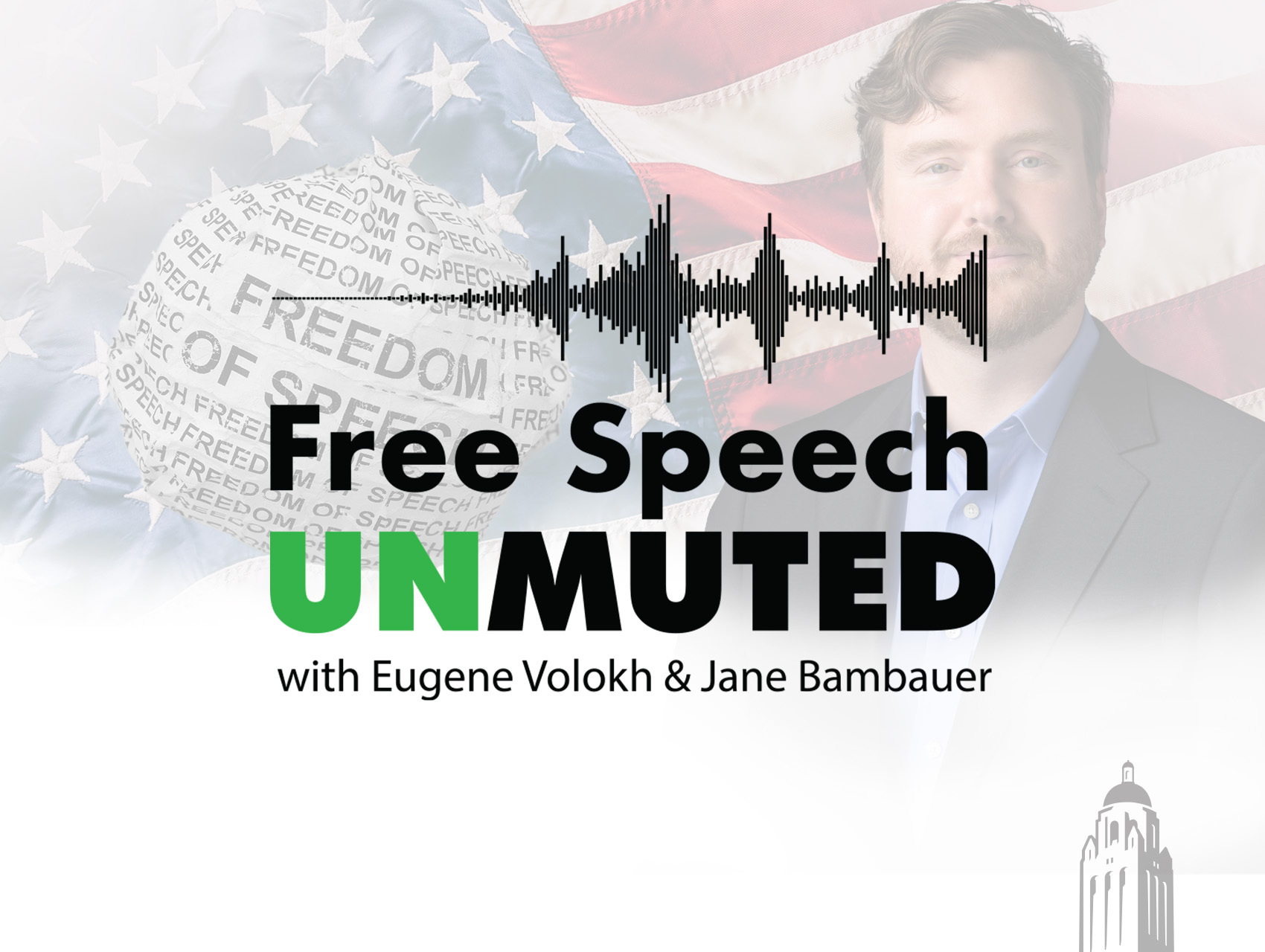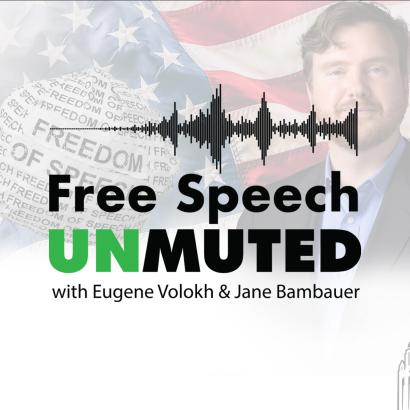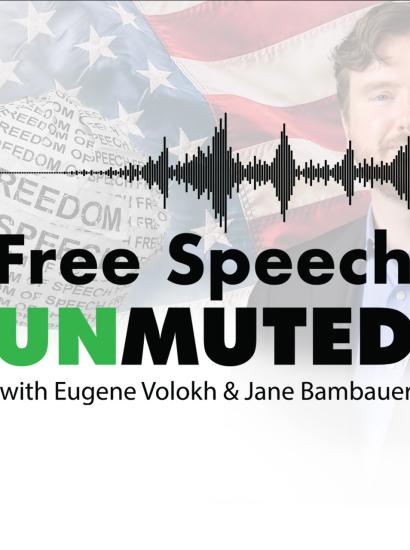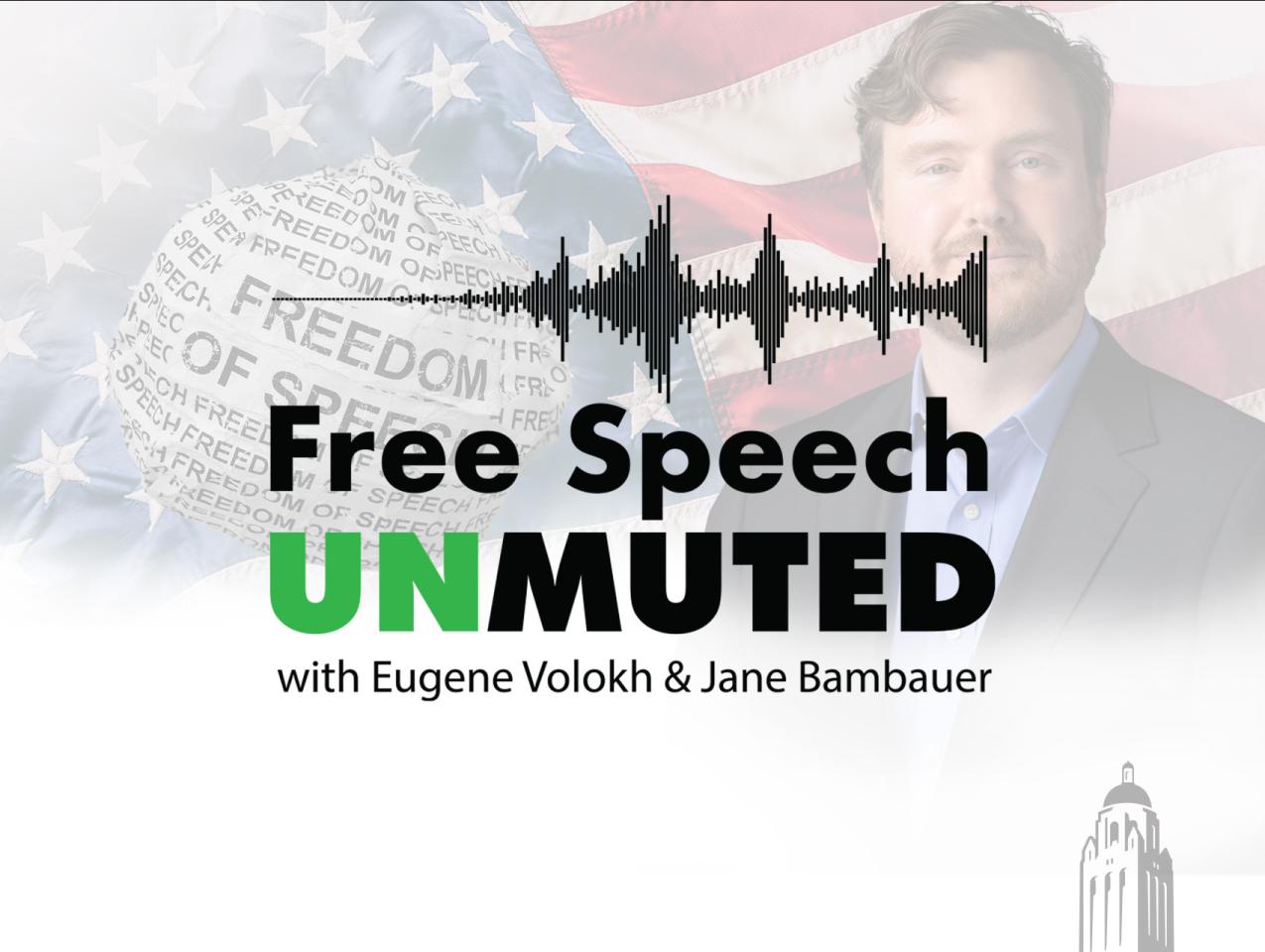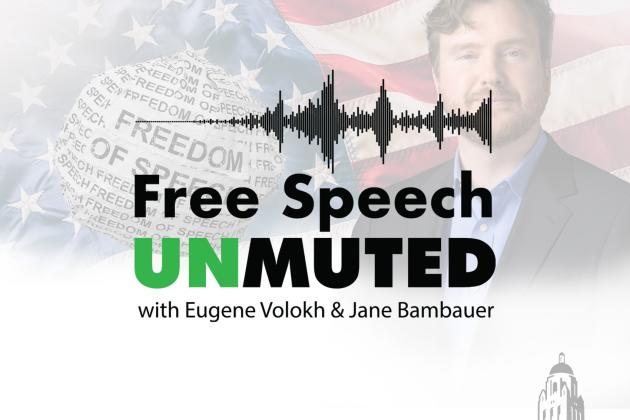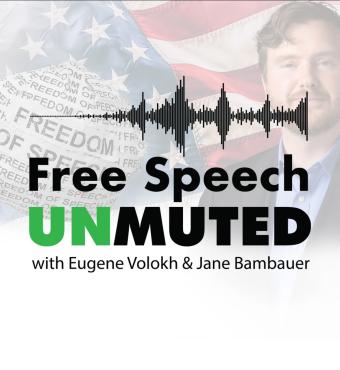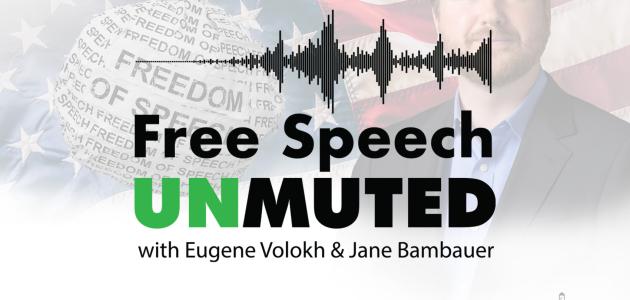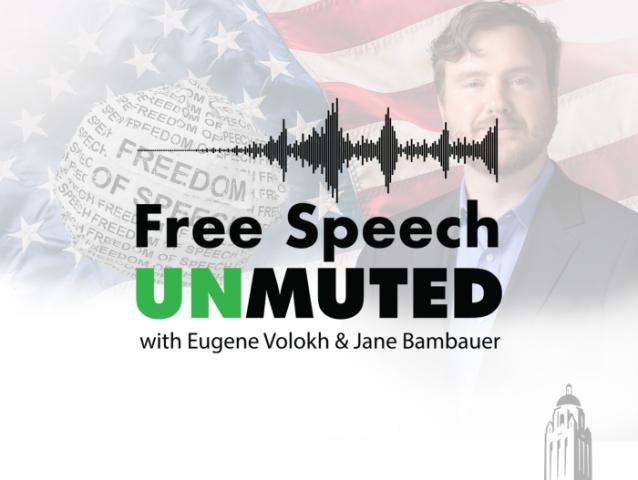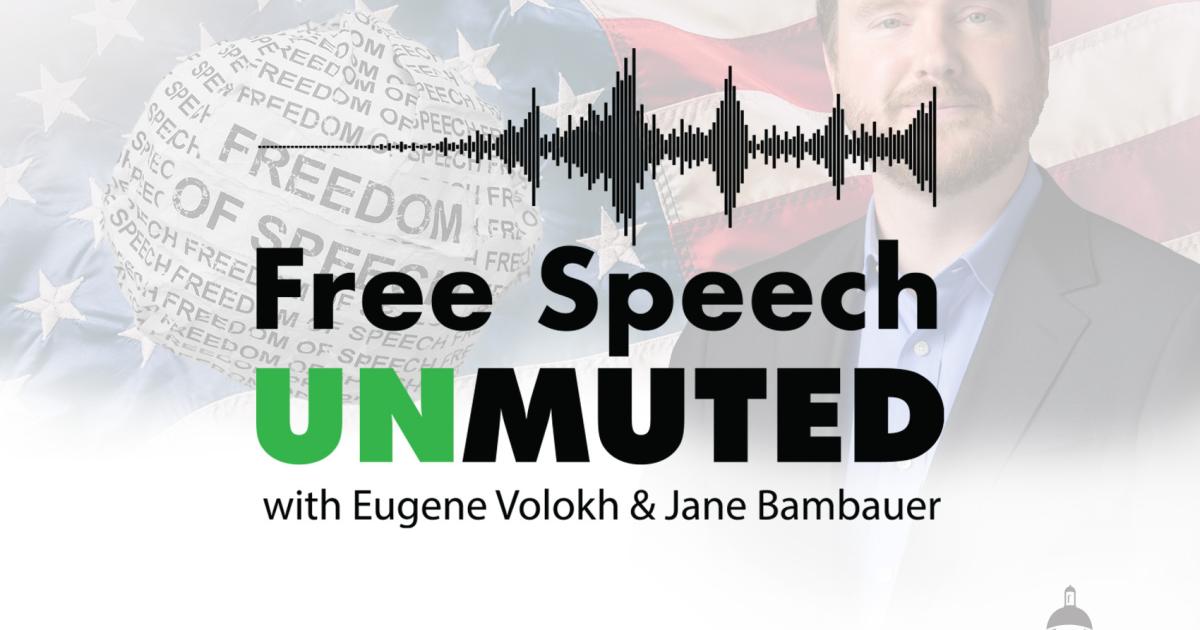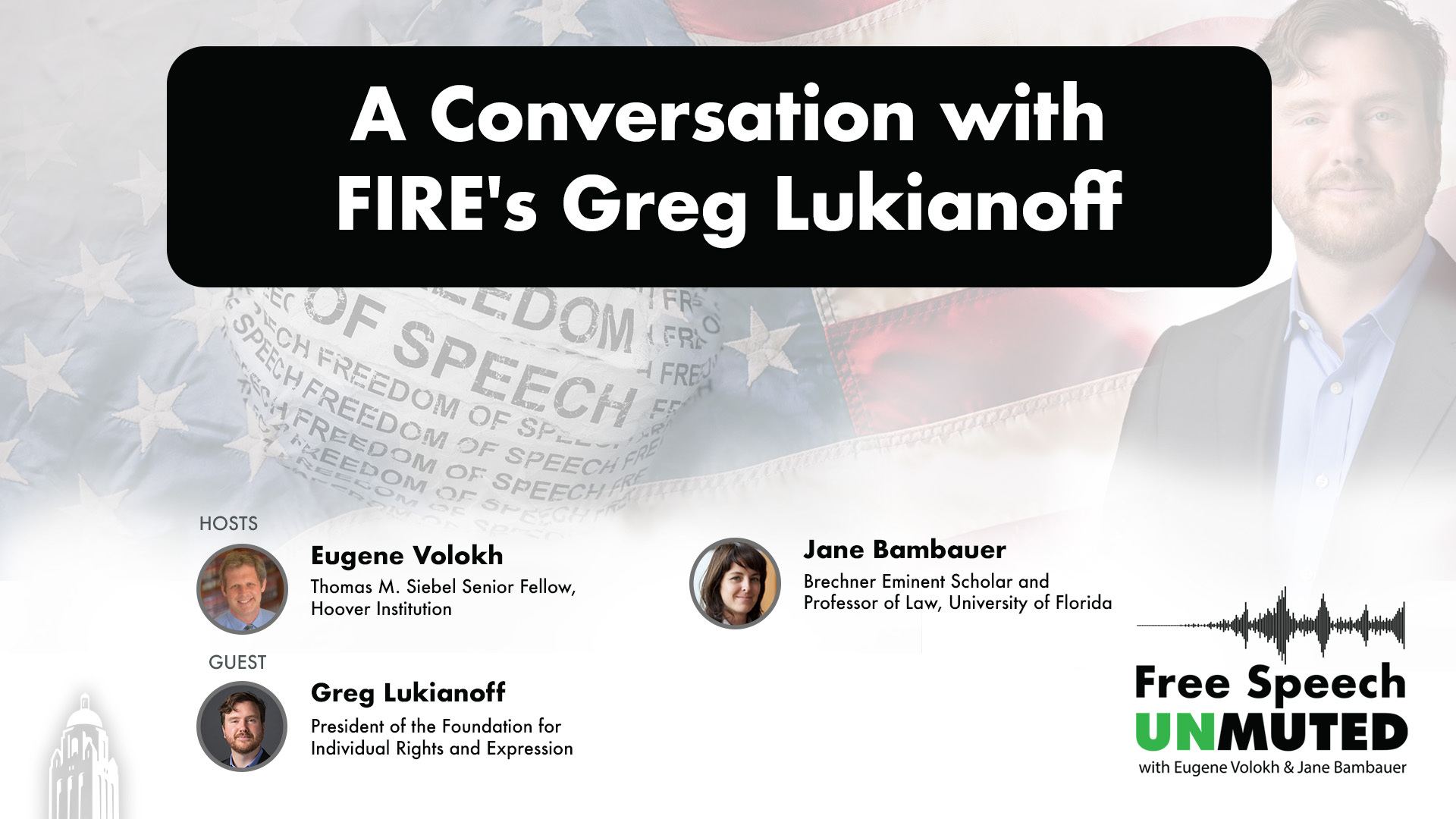- Law & Policy
- Politics, Institutions, and Public Opinion
- Revitalizing American Institutions
FIRE is one of the leading free speech advocacy and litigation groups in the country, and Greg is not only its long-time head but also coauthor of several books, including Coddling of the American Mind (with psychologist Jonathan Haidt) and War on Words: 10 Arguments Against Free Speech—And Why They Fail (with law professor and former ACLU President Nadine Strossen). Jane and Eugene talk with Greg about free speech lawsuits, free speech debates, and more.
Recorded on September 4, 2025.
>> Eugene Volokh: Hello, welcome to Free Speech Unmuted. Today I'm joined by my co-host, Jane Bambauer of the University of Florida. I'm, of course, Eugene Volokh from the Hoover Institution at Stanford and emeritus professor at UCLA Law School. But we're especially delighted because today we have a guest, Greg Lukianoff, who is the president of the Foundation for Individual Rights and Expression.
Free speech law is interesting and important. It gets set by the Supreme Court, but it doesn't just get set, but by the judges in the abstract. It happens because of cases that are brought by lawyers, and then it doesn't get enforced just on its own. It's enforced cases brought by lawyers.
FIRE is one of the leading, I would say the leading, but certainly one of the leading free speech advocacy and litigation groups in the country. I have, on occasion, consulted for them much more often. I've represented them myself in amicus briefs. They have represented me in cases as well, and still are, actually.
So I've worked very closely with them for much of the 20 years that they've been in existence, but certainly especially over the past several years. So we're very, very happy to have Greg here. And, Greg, tell us about fire. Tell us about what's happening now. Tell us about what your vision is for the future.
Tell us about interesting tidbits from the past, whatever you like.
>> Greg Lukianoff: Well, tragically, business is booming, and that's never a great sign for the country when we're incredibly busy. That means there's a lot to fix. And it's been kind of exhausting, to be completely frank about it. I spent yesterday just on the media kind of like pretty much all day, partially talking about Britain, interestingly enough, but also talking about the Harvard lawsuit, also talking about our lawsuit against Marco Rubio.
It was a heck of a day. So when I joined in 2001, I was the first legal director of fire, and there was five staffers and Ned, so there was six of us, and now there's 120 of us at fire. We're much larger now. I think we need to be easily twice that to handle the caseload that we have coming in.
But we've grown by. By quite a bit. And we're always doing interesting and exciting things that go well beyond just litigating. Litigation is actually this very important part of what we do, but it's not a small part. It's the largest department of FIRE in terms of expenditures, but the second largest department and very close to it in size is comms communications, because we don't just Want to win a battle for free speech in the courts.
We want to win a battle for free speech in hearts and minds and explain it as a philosophy or way of living, not just something like a dead legal idea that people don't. That people don't understand the law that well, which is most people. Somehow it goes over their heads.
So that's one of the reasons why we do really creative projects, including we write lots of books. I wrote Coddling in the American Mind and Canceling of the American Mind are two of my books. We did documentaries. One about Ira Glasser, the former head of the ACLU until 2001, and his commitment to defending everyone, focusing around the situation with the Nazis at Skokie, for example.
We did a documentary on basically cancel culture and comedy way before that was on anyone's radar. But in terms of the stuff that I'm talking about today, and I know that we're just doing this audio and not video, but I'm still showing them anyway. We've got several books.
I got a new one that just came out with Nadine Strossen, the former president of the Border of the ACLU called the War on Words. It's me and Nadine answering ten arguments that people always make against freedom of speech. And Nadine, she's so much nicer than me. Sometimes when I do shows with her, I just feel like this grumpy old Russian, because I'm like, I am answering these arguments that I am sick of having to answer, you know, like the.
And she's like, no, I love answering it. It's tremendously fun. So this is us trying to put all these arguments in one place. Sara McLaughlin at Fire just came out with a book called Authoritarians in the Academy, which is about how policies, you know, emerging and practices emerging from China, Qatar and other totalitarian countries damage free speech on American campuses, very interesting book.
And lastly, for the books, we're coming out with a reprint. So Ari Nair's classic, Defending My Enemy, which is actually about why a Holocaust survivor, Ari Nair, would actually. Why he would actually defend the Nazis at Skokie. And it's a beautiful book, it's a great book. And it was out of print, so you had to pay a ridiculous amount of money to get a copy of it.
So fire, along with the ACLU, we got it reissued, and it's going to be coming out, I think, next month. So lots of cool things going on in addition to lots of troubling things. So happy to talk about any of It.
>> Eugene Volokh: Well, that's a lot to talk about and just hard to know.
>> Greg Lukianoff: I need a nap.
>> Eugene Volokh: Hard to know what to turn to first.
>> Greg Lukianoff: We also just got a decision on the Harvard case, like the-
>> Jane Bambauer: Are we gonna talk about that first? Or, you know, I kind of wanted to ask. I would love an example of something that is an easy case, and yet the problem is cropping up a lot, and you're kind of almost annoyed that Fire has to deal with it at all.
And then I'd also love an example of something that you think is genuinely a hard case in terms of, you know, having to set new First Amendment precedent that you're nevertheless having to think about, because it's coming up. Want to start with either of those?
>> Eugene Volokh: Great questions.
>> Greg Lukianoff: It's a great question. And I'm having a hard time distinguishing easy from hard cases at this point because we've gotten so many curveballs in terms of sort of policy from the Trump administration that sometimes things we're like, well, this should be laughed out of court. So I'll give you an example of a case that we thought was easy, and it was in Texas, and this was a drag show that adult college students put on for adult college students.
None of the additional complexity of involving children. None of this stuff. And they put this on and they asked, I approve all the litigation. And I was like, yeah, of course, so it should be a slam dunk. And we actually lost in the Western District of Texas on this case at first.
And I was blown away. I was kind of like, bur this is a layup. We have since, proud to say we've won on appeal. It was. But we shouldn't have lost in the first place. So, like, cases like that sort of shake my ability to kind of estimate, you know, where, like, what an easy case is versus versus a hard case.
And I've had a couple shocks like that over my career when it comes to a case where in some ways we were pleasantly surprised but almost shocked the extent to which the opinion from the judge on Harvard was exactly what Fire had been saying the entire time. Yes, potentially, could a school be found guilty of violating Title 6 for creating an anti Semitic atmosphere?
But, no, the government hadn't actually gone through the procedures that it needed to. They even went so far in that decision to say that it seemed like this was more like a smokescreen to get the school to. To do all these additional things that the Trump administration wanted Harvard to do, and that this exceeded the power of the president, which is exactly what we've been saying.
They actually didn't reach the ultraviolet argument, in part because basically the case was already won. So when you get reaffirmation of what you'd been saying, you start to feel like maybe you're not taking crazy pills. But lately, for about six months now, it feels like we're all been taking crazy pills.
>> Eugene Volokh: So the thing is for free speech, people. What sounds like a crazy argument to us and is crazy under the law may not seem crazy at all to others. Can you elaborate a little bit on the drag show case? I agree that it should be an easy case, and, you know, it's hard to keep everything together.
I think in a different case, I cosigned an amicus brief arguing that drag shows are protected. Just explain briefly why drag shows are protected, including its universities because in that case, it was a university that said, we don't want drag shows on our campus. Why is that unconstitutional?
>> Greg Lukianoff: Yeah, I mean, because it's expression that essentially your right to put on a show in which you dress up like the opposite sex is considered part of your artistic expression, and I believe very strongly should be. I didn't even think of it, like I said, as a particularly hard case.
And the rationale from the district court, it's hard for me to really explain. Eugene. Basically, it was arguing that this could be at one level offensive, but even saying pretty much in the opinion that. Or actually the university president said that this may violate the Constitution, but essentially, I don't care, which is never a very good thing to say if you're a university president.
So I can't really do justice to the rationale that the Western Western District used in it, because I didn't even entirely understand the argument it was trying to make.
>> Eugene Volokh: Got it. And what about the fact that this is at a university? Why does that not matter?
>> Greg Lukianoff: I think it matters, but I think it matters in the sense that the doctrine of academic freedom in terms of First Amendment law exists.
But what exactly it says, I think we can all agree, is a bit of a mess, but it does seem to. And I think David French put this very simply, which I thought was nice. It just seems to be sort of like a plus factor, like basically saying, like, in this realm, free speech considerations are extra important.
Now, it also has much more specific things, like there's institutional academic freedom, there's professorial academic freedom. That's where a lot of the action is when it comes to that. And the Harvard decision, by the way, is very much about institutional academic freedom. I'm probably the most skeptical at this point of departmental academic freedom arguments because they've just did so terribly at this point that my faith in that part is shaken.
But the law doesn't say a lot about that anyway. It says the most about professorial academic freedom and institutional academic freedom, so.
>> Eugene Volokh: But in the Texas case, it was students who were putting it on.
>> Greg Lukianoff: It was students. Yeah. Yeah. But what I'm saying is, with regard to academic freedom, one of the colloquial way David explains it is basically saying this is a realm in which we take free speech considerations especially seriously.
And there has been cases, including the ugly woman contest at George Mason University, where frat boys put on a deeply offensive show where they dressed up like stereotypes in some cases of minorities.
>> Eugene Volokh: Yeah, I believe in blackface, I believe.
>> Greg Lukianoff: Was it even in blackface?
>> Eugene Volokh: I think so, but I'll look it up, but I think so.
>> Greg Lukianoff: And that was found to be protected because it was a artistic show. It was supposed to be offensive. That was kind of the point. And even that was found to be protected.
>> Jane Bambauer: Yeah, I imagine, correct me if I'm wrong. Did the university say, well, look, these are our facilities and you know, this is not a traditional public forum.
These are, you know, whether it was on a stage or I'm not sure where the venue was. But could, could they have claimed some kind of, you know, were they trying to make an argument that, that they, they reserve some control over how their facilities are used or was that part of the case at all?
>> Greg Lukianoff: They tried, they tried a bit of a kitchen sink approach to justify it and it ended up with. I really wish I could remember exactly like what they were, what, what the actual rationale was for the decision. But it was definitely like, really.
>> Jane Bambauer: Okay.
>> Greg Lukianoff: It was strange, just to say the least.
Right.
>> Eugene Volokh: But even in on government property, even if it weren't a university, even if we're a library, let's say, or if it were a city owned theater or whatever else, viewpoint based restrictions on private speech are unconstitutional. And here it was quite clear that the university's argument was that they disapprove of drag shows because they convey the wrong viewpoint on gender.
>> Greg Lukianoff: Yeah. And that's why I thought it was going to be such an incredibly easy case. And we did, eventually win on appeal, which I appreciated. Jane's question, though, about a case that actually is. Could be hard for people. I think a Good case of this. And I say this within the First Amendment community that yes, I do think that people who are non citizens who are in the United States have First Amendment rights under a case called Bridges v.
Wickson, 1945. And we've defended students who are here on visas when they get punished just for their protected speech. But I still think that's a little bit of an advanced technique for most people. It's one of these cases where if you're in the First Amendment business and we came out with, so for example, we're charged, we have a lawsuit against Marco Rubio because there are two provisions in existing law that allow the Secretary of State to kick a non citizen out of the country.
And it's two different scenarios. One is if they're found to have done something that was adverse to foreign policy, and the other one really is pretty open-ended ended more or less saying that if the Secretary of State determines they can kick you out. And the only time that one of these provisions has been challenged, by the way, it was ruled unconstitutionally vague and broad by Trump's sister, which we always found to be a good fact.
It was. Later the case was overturned for completely separate reasons. But the one time the substance of it had been challenged, it was ruled unconstitutional. So we believe that, yes, you can be highly subjective in deciding to give someone a visa in the first place or letting and become a citizen even from suspicious countries like the Soviet Union.
Eugene, and-
>> Eugene Volokh: It was a suspicious country. People like me who immigrated there, well, I was 7, but, but people older people were kind of screened a little bit.
>> Greg Lukianoff: Absolutely. But I mean, my, my dad, you know, like we were fleeing. My dad actually grew up in Yugoslavia, but we were fleeing the Bolsheviks is why my dad was born in Yugoslavia.
And the I within fire there was kind of, there was a little bit initially of, kind of be screening people for political opinion whatsoever when, when they come in. And I'm like, if my dad lost his spot to who? My dad, who loves this country and what it represents, lost his spot to another Russian who was like, yes, I want to overthrow you.
Leninism everywhere. I'd be like, yeah, no, I wouldn't, I wouldn't be so, so cool with that. So the idea that there's subjectivity on the, on the, you know, visa application, all this kind of stuff that's something that I think you just have to accept in a situation of limited sp.
Someone who's going to be a good citizen over someone who's not. But when they're here, we believe that they should have. They should not be kicked out for speech that would not be. Bannable for an ordinary citizen. And in First Amendment circles, like, there's this kind of, like, adamant.
Kind of like everyone understands this right, and anybody who doesn't get it is a troglodyte. And I'm like, let's. I think this is actually a little bit more of an advanced technique. I think we're absolutely right on it. But when people get mad at us about this one, I'm like, I get it.
And particularly given that some of these schools they were looking for people who were aggressive activists in other countries who seem to have some sympathy for terrorist organizations that I'm not particularly fond of.
>> Jane Bambauer: Yeah, I mean, assuming that everyone agrees that the government has sort of full autonomy to decide who comes in in the first place.
And I think Eugene and I have discussed this topic before, and we agree with you for the most part that as a matter of sort of First Amendment sort of principles or policy, it makes sense to give visa holders some protections. But it is a little weird that suddenly.
Suddenly, you know, even though we could still say that there's some limited number of spots or visas issued where some, you know, and so you could, you know, justify, or you could argue that the government should be able to revoke one and, you know, make more room for others or something, there is this.
Once you're in, you're in kind of rule that makes some sense. Maybe. Maybe in part because we recognize that what the government is fearing is the provocative ideas. It's not kind of the person coming in. It's the idea kind of becoming too potent and effective. And I don't know.
I'm not sure even. I'm not sure how to defend that line, but.
>> Greg Lukianoff: Well, I did two shows yesterday in my sort of marathon of podcasts, and one was with Megan Kelly, and she doesn't.
>> Jane Bambauer: I heard it, actually. I listened to it.
>> Greg Lukianoff: Yeah. And she doesn't love our position on the Rubio lawsuit.
And she's always a fearsome person to go up against because she's a tough person. But I actually kind of walked her into it rather than her introducing it by being like, she was really concerned about. And I always mispronounce this guy's name, Graham Linehan, Linehan. He's a guy who wrote the IT Group, he wrote Father Ted.
He's a comedian who writes popular BBC comedies and he got arrested at Heathrow, with five armed which is unusual in Britain. Police officers showing up to arrest him for offensive tweets, which I think were pretty all clearly jokes, by the way, and they were, you know, arguably anti trans jokes.
And he was arrested. And Megan was really worked up about this, but I knew she opposed us on the. And he'd just come from the United States and I was like, you know, can you imagine in an AOC administration, for example, like that under this she could actually kick him out of the country, send him back to England, where he'd be.
Where he'd be arrested. And then she hung her hat a lot on the idea that one of the provisions that we're challenging requires it to be adverse to foreign policy, which is a pretty thin read to hang it on. But also, I should have made the point that actually the other one doesn't.
That essentially, yeah, we would find that if we want to take ourselves seriously as the country that people flee to when they've said something offensive to another government, the idea that we would kick people out for nothing more than saying something that any other citizen could say is troubling to us.
>> Eugene Volokh: So what you're saying makes a lot of sense. And I also agree that the question of deporting aliens for their speech is a tougher question, certainly tougher under the precedents. Raises some more complicated policy questions as well. Although unbalance is a policy matter, I think I'm largely in your camp.
I do want to mention as to the Graham Linehan thing, I'm not sure whether the tweets were really jokes.
>> Greg Lukianoff: There was one in particular I'm looking at right now. I had to write briefly about it. Well, didn't have to, but I wanted to write about it. I think yesterday.
If a trans identified male is in a female only space, he is committing a violent, abusive act. Make a scene, call the cops, and if all else fails, punch him in the balls.
>> Eugene Volokh: Yeah. You could imagine that that's kind of very dry humor. Maybe the violent and abusive act is an attempt to parody the left's, or at least the insistence, shouldn't say the left of many on the left of calling various things violence and abuse, but.
>> Greg Lukianoff: I took punch him in the balls as actually being almost the definition of a joke, like saying I couldn't turn it and punch him in the nuts. But also, if it's conditional, though, like, basically, if you look at the structure of that whole thing, they're saying, like, if someone's doing this thing that's breaking the law.
You should do all of these peaceful things first. But if that doesn't work, defend yourself. Right, although defend yourself in a way that I think wouldn't be authorized in an American self defense law. I don't think it would be authorized under English self defense law either.
>> Eugene Volokh: You can't punch someone in the balls under American self defense law.
>> Greg Lukianoff: You can do that if they're actually trying to attack you. If you reasonably fear that they will attack you. If they are simply in a space even where they cannot legally be. And it sounds like they. They probably could legally be there, you can't just punch them in the balls for that.
>> Eugene Volokh: Okay. I used to teach criminal law and self defense law at a unit on self defense law, so I just thought I'd mention.
>> Greg Lukianoff: That's really interesting. I really thought of it that way.
>> Eugene Volokh: I do think his speech would be protected under the first.
>> Greg Lukianoff: Sure, yeah.
>> Eugene Volokh: It does sound like it is a call for illegal violence. Some other countries may have different rules than say, Brandenburg, but I think this helps show that probably our approach is better. I just wanna flag that there's at least some uncertainty as to whether the tweets were really all jokes.
I'm sorry, Jane, you were saying?.
>> Jane Bambauer: It's not fully a joke. Like most good jokes. It's not only a joke, but it is also a joke. Right?
>> Eugene Volokh: Right. There's a Russian saying I heard from my father. Maybe it was just his saying, but in every joke has a little bit of a joke in it.
>> Greg Lukianoff: Yes.
>> Eugene Volokh: Yes, it's mostly not- It's not really about the joke, but there is at least a little bit of a joke.
>> Greg Lukianoff: It's very much like my father's sense of humor. Yeah, I mean, for example, when I talk about this distinction between speech and violence, and I talk a lot about this, and this was a very hot sort of analogy to make for a long time on campus.
It's died down a little bit. But one of the things I'd always say is, well, that sounds like someone who's never been punched in the face. And it was a great laugh line. And it's like, yeah, I meant it to be laughed at, but it's also true. Essentially, if you've experienced real violence, you tend to think that way.
So I guess if we're trying to decide if it's pure humor or not, and we get. That would be an interesting.
>> Eugene Volokh: Right, so actually this touches on something that I wanted to ask about. So when I blog about things that fire does, some of the readers on my blog are on the left.
I'm happy to have them. Blog is mostly center right or libertarian, conservative, whatever. Very happy to have readers from all over, but sometimes they say, yeah, fire only represents. Conservative speakers. I think that's very strange. Not the fire. I know. And you know, often other commenters say, look at this list of the cases where represented people on the left, as it happens, perhaps because of the timing, the examples that you gave of cases that fire has taken are ones of defending speech that is vaguely seen as on the left.
Drag shows and Harvard, let's say.
>> Greg Lukianoff: Yeah.
>> Eugene Volokh: What do drag shows and Harvard have in common? Well, there's speech vaguely on the left that fire supports. So tell us a little bit about some things on the right just so that our listeners recognize. What I've always recognized about fire is that you folks really do protect speech on all sides of the aisle.
>> Greg Lukianoff: Absolutely. Yeah. It's one of those things where it like, used to kind of hurt my feelings when people would make claims like that, you know, and now it's just kind of like, dude, if you're not going to do your basic homework, like, I don't. I'm not going to waste my time on this.
And the nice thing is now, now other people do it for me, like the people I've never even met before. Like, well, what about the following 50 cases? It's like, there you go. But when it comes to. Yeah, cases on the right, you know, like there. Actually this is another lawsuit that I'm a little brokenhearted about.
We had. So we took on the Stop Woke act in Florida and, you know, we were one of the groups that actually defeated the Stop Woke act in Florida. But there was a case that I considered even more troubling than that. That case, it was a policy, and I believe the community college system guidelines for the entire California system that said you had to work in sort of DEI language concepts, etc, into your syllabus and into your teaching.
And it was explicitly talking about things like anti racism and that kind of stuff. And I was, I wasn't totally shocked by a policy like this, but it was really saying that, like, listen, even if you think this stuff is bs, we're not. And we're not really saying that it should be incorporated in any kind of hostile way.
We're really implying that you should positively incorporate these into your teaching. And to me, that's one of the worst things I've ever seen because it's saying it's invading the academic freedom of professors and compelled speech at the same time. And so we brought a lawsuit with this. And our plaintiffs included a chemistry professor who gave us a great quote that was something like, I'm not really sure about what the anti racist angle on the atomic weight of boron is, which I thought was like really cute.
So we brought this lawsuit, we got into like district court level and it got essentially dismissed because the university promised to play nice. Essentially like, we don't mean it that way and like we won't enforce it that way. And more or less, you know, the court took the system's word for it that they won't abuse it.
And I'm like, okay, I'm sorry, this should have produced a scathing opinion saying, how dare you actually even attempt to do this. But, so that's one on the right that we lost, which I'm not the least bit happy about. We do have a similar case, you know, up in Washington State involving, what are those things called?
Land acknowledgments.
>> Eugene Volokh: Yes.
>> Greg Lukianoff: Which is a case that I think is hysterical because, and this is a left leaning professor here, but he does not like you would like or any of us would like being told what to say. And so he was told it was policy that he had to work a land acknowledgment into his materials.
And so he worked in a land acknowledgement that said, well, under the labour theory of property, actually, they didn't really actually work the land. So actually this isn't owned by the following groups that were supposed to do the land acknowledgment tour. And he got in trouble for that.
And that's a lawsuit that's currently, currently ongoing. So we've had lots of cases like that. We have a pronoun case involving Professor Bug which goes back years. And I actually not remembering all the details there, but it's a little different than some of the other cases in that he's not actually saying he has a religious objection to it, to calling someone, that he has a philosophical linguistic objection to calling his students by different pronouns.
And he figured out an accommodation of just, I'll call students by their last name James. And that wasn't good enough back then. So we have plenty of cases from all the spectrum, but over the last, since the Trump administration, we've had a lot more cases coming our way that come from overreach by the right largely to address what they see as addressing social justice fundamentalism or wokeism or whatever.
But it doesn't mean that you can still. For example, another case we're involved in, a pollster in Iowa named Ann Selzer, she got a poll wrong back in November, very badly wrong, to be clear. She had Harris up by two points in Iowa, Harris actually lost by like 11.
So it was like a 13 point misstep. But she explained how she got it wrong, explaining it's a methodology that was very effective, say, 15 years ago that just really isn't anymore. She shared her weighting and then she announced she was. She apologized and retired. But Trump himself brought a lawsuit against Seltzer under Seltzer, under a Iowa consumer protection law, which makes about as much sense as it sounds like, you know, something that's basically saying that you can't sell fat pills that claim you'll lose £40 a day kind of law.
Not something that says if you get a poll wrong that's illegal in this state. And that's still an ongoing case that we have. So we've just seen a lot more, like, since the Trump administration started, we're finding that there are some people who now suddenly respect us on the left.
So we had this, this profile about us in the New York Times that had a little bit of the inclination, a little bit of the language that made it sound like much to the surprise of people, fire is defending people all over the spectrum. And we're like, okay, I'm sorry, nothing has changed here.
We've always been like this. Just like who we're actually up against is different than it's been previously.
>> Eugene Volokh: Right. You know, this just reminds me of at one point, I think it was, it was my wife who said, largely as a joke, that she had this dream in which I was doing something that I shouldn't have been doing.
>> Eugene Volokh: I said, I'm not responsible for my behavior in other people's dreams. So I think this is like, you're not responsible for your behavior and other people's illusions in their mind.
>> Greg Lukianoff: I love that.
>> Jane Bambauer: Yeah. I think you have a chapter, you have a chapter in the, in the new book that addresses this misconception of free speech being a right wing thing.
Right.
>> Greg Lukianoff: Yeah. And what am I supposed to do with that? You know, like, people were asking me, like, I've gotten this question very gravely sometimes from reporters. It's like, well, I mean, isn't it a problem that people see free speech now as a right wing cause? And I'm like, no, it's your problem that you see it that way.
There's no way I can help you if you're at the stage of moral development where you believe because bad people are making an argument that means they must be wrong. And therefore even the neutral principle they represent is somehow tainted. I can't help you with that. That's a BS way to argue in the first place.
All I can do is try to remind you. So I gave a TED Talk and the mantra I actually got the whole audience to. To say this, by the way, I had. I was like, look at your neighbor. Just look at your. Look at your beautiful neighbor. Look, right in their eyes and say, just because I hate your guts doesn't mean you're wrong.
Just to really try to get this in their heads. And it's basic stuff, but we seem to have largely forgotten it. There is so much that is basic, but we have largely forgotten.
>> Eugene Volokh: Yes, yes. So. So that's great. Tell us some more about your book.
>> Greg Lukianoff: It was.
I mean, getting to work with Nadine.
>> Eugene Volokh: Yeah, so you're talking about Nadine Strossen, we know her. We know her very well. But our listeners might not tell us. Tell us a little bit more about her.
>> Greg Lukianoff: Sure, former president of the ACLU, she started the aclu, you know, pretty, quite young.
And she was there, I think she started in the late 1970s, like, right after Skokie. And she was there for kind of like the glory days of the ACLU when I was, like, a little kid, you know, in a largely immigrant neighborhood, being like, my God, there's, like, Jewish lawyers who will defend the rights of Nazis.
There are these people who are, like, almost comically committed to free speech to the level at which they will rush to be the first one to defend people who hate their guts. That's principled, that was impressive. So Nadine was a absolute hero of mine, and I actually met her for the first time at Stanford.
I was introduced to her by Kathleen Sullivan, who's my mentor and I think was the dean of the law school at the time or just about to become it. And I barely talk good when I met her, because it was such a big deal to meet Nadine Strossen.
And she retired from the board of the ACLU. And I think around 2008, I might have that right, 2006. And she is now a senior fellow at FIRE, and she likes to make me uncomfortable by pointing out that I'm her boss because there's something creepy about it. It's kind of like, no, you're my hero.
I'm not your boss. But we started doing this series. I did a thing for this now defunct magazine called Aereo, where I don't remember what the origin of it was. I was like, hey, I think I just threw out the idea. Can I just write you something where I just give quick answers to my least favorite arguments about free speech?
And they were like, yeah, sure. And then it came out, and Nadine really liked it. But she was working on something very similar for a book that she was working on. And she noticed that although we agree on a lot of things, the way we get to those conclusions are very distinct from each other.
So we started doing it as a series on the first version of my now substack, the Eternally Radical Idea, which by the way is a reference to freedom of speech. Cause I believe freedom of speech is radical in every generation. And we did it back then, but then we got approached by Heresy Press, the small press, if we had any material that they could publish pretty soon.
And so we updated all 10 of the maybe 18 arguments that we made, actually fused some of them together, and were able to come out with this pretty much in record time. And it's just such an honor to be able to work with her. I'm just beyond thrilled.
It was funny though. I did actually run all our arguments between. I ran all our arguments into ChatGPT to see what it thought. And I asked what are the.
>> Eugene Volokh: What it thought in quotation marks?
>> Greg Lukianoff: No, no, it's conscious, sorry, that's a joke, but a long joke.
Anyway, so I asked like, what the differences were between us. And it basically said, well, you know, Lukyanov seems to be much more interested in psychology and I was like, my God, like that's really funny that that comes out in what I write. And meanwhile, my father, Vasily like he would say as a kid is like, you should study psychology.
And so I went to law school, did constitutional law, much to his disappointment, because that was too parochial as far as he was concerned. And nonetheless, I have somehow found myself to, you know, trying to combine free speech and psychology.
>> Eugene Volokh: Great. So that's the story behind the book.
Tell us a couple of items from the book, actually.
>> Jane Bambauer: Can I ask about one in particular? Well, so I saw there's a chapter that tackles the argument of free speech. Just, just is like, just provides a shield to the powerful or something like that. And I think this also, this relates to the misconception that free speech is a right wing thing.
Because I think if progressives think of themselves not as classical liberal, not as libertarians, but as progressives, there where their main goal is to protect the little guy and free speech is invoked by powerful corporations. Why are they wrong? Greg?
>> Greg Lukianoff: Yeah, no, this is one that is also heavily featured in my TED Talk because I think it's just very important.
The way I explain it, there is, I say, I talk about how there was a major shift in the kind of students that Fire was running into, say, 10 years into our existence, say around 2009. And I was running into a lot more younger people who seem to make the argument that free speech is the argument of the three bees, which I.
Which I say are the bully, the bigot, and the robber baron, the rich person. And the way I always explain, it's like, okay, little, little. And I would just say, I'm sorry, that's just bad history. Because when it comes to freedom of speech like, it's all about your relationship to power.
And when it comes to the rich and powerful, they're historically protected by being rich and powerful. I mean, a lot of the story of democratic governments is the monarch going to the merchant class to ask for money and then them demanding some things in return. So the rich and powerful are protected by being rich and powerful.
So they don't need some special protection for freedom of speech. They are the powerful. But when it comes to the bigot and the bully, once you get to democratic government, if they have enough votes, if the majority, you know, have bigoted ideas or, or bullying ideas, they still win.
If they have 50% of the vote or more in whatever system, if they have a majority vote, whatever, if the majority holds that point of view, it still carries the day. You literally only need a special protection for freedom of speech for two categories of people, people unpopular with the majority.
And that's one of the reasons why minorities have flocked to freedom of speech time and time again. Whether that's in the civil rights movement, the women's rights movement, and the gay rights movement, or people unpopular with power. And this is where the progressive friend is wrong, is that essentially they oftentimes don't see the force of government as being power itself.
You know, like essentially the corporations, if they really were running the show, they wouldn't need it. They wouldn't even probably be asking for it. But when it actually turns into something as big and monolithic and powerful, the only institution that has legitimate control over the use of violence has the power to tax, has the power to do any number of things that could destroy any institution.
That is the definition of power. And if you're unpopular with them, you need a special protection for freedom of speech so we can actually maintain, you know, freedom for all. So I do think, and I think. I honestly think a lot of this comes from the fact that on campuses, and Herbert Marcuse himself did this, there was an unwillingness to ever admit that locally on campus.
People on the left are not just powerful, they're monolithic, not quite monolithic, but they run pretty close. They run everything. They're powerful there, and they don't like to admit this fact. And so they still want to think of themselves as standing up for the little guy when they really represent power, power pretty comprehensively, like in this, in this sphere.
But if you don't have to admit that, you can kind of pretend that you're standing up for the little guy. But clamping down on speech that might be offensive to upper-class people.
>> Jane Bambauer: Do you think something is happening right now with the sort of more conservative or sort of Trump, in the Trump era on the right?
Is there I keep hearing this term woke, right? Do you think that there's something to that? That some of the methods that we saw on campus are being used, maybe not on campus, but in other contexts to use similar tactics, similar bullying tactics and speech policing on the right?
>> Greg Lukianoff: So definitely we've seen a big uptick in professors and students getting in trouble from their right. That doesn't always mean from the right, but it means from their right. And that's really the only way you can measure these things, I think effectively, because otherwise it would just look like the only people who get in trouble ever are center left professors.
Because that's not that many conservatives get in trouble that often on campus in the first place, because there's not that many conservative professors on campus in the first place. And so you can't. So you'd end up with skewed numbers. So we definitely have seen like an uptick in professors and students getting in trouble, lefty professors getting in trouble from their right.
The thing that scares me even more than that, though, is something that I personally haven't had that much experience with. But since we know lots of people in sort of like the libertarian sort of legal movement who have more exposure to students who consider themselves more MAGA. Or conservative is they say things that sound pretty hostile to a lot of what we like in liberalism, to essentially it's just the war of all against all like some person.
And I don't know if he's trying to scare me, but it's like, yeah, there was one right wing dude I was talking to who was calling himself a monarchist and I was like, please tell me that's not correct. So I do think that there is suspicion of small L liberalism both on the right and the left right now.
And that's scary. That's my legal opinion. It's scary.
>> Eugene Volokh: Yeah, exactly. That's a technical legal term. So this has been tremendously interesting for us and I'm sure for our audience as well. Anything else you want, you want our audience to take away from this about free speech, about fire, about whatever else?
>> Greg Lukianoff: I just think FIRE is just a really unique organization. And I wrote a long piece about what makes us so different, and one of them is just that we actually try to have people who vote for different candidates as part of our staff. And that's one of the things that keeps us intellectually honest.
But that's hard. We would be I make the point that if we wanted to go the easy way and be a giant institution 15 years ago, if we tacked hard left or hard right, I could have made Fire $100 million shop in 2010, probably. But we've gone the much harder way, which is anger your donors sometimes when you take on a case that they might like, play no favorites when it comes to politics.
And that I had a donor actually lovingly tell us and he said this with admiration, but it was so funny nonetheless. He said, it's like, Greg, you have a terrible business model in terms of angering your donors. But I do think that ultimately, one. Something that I've also seen in this long pattern is sometimes those very same donors come back to us because they start to put together that there's no other way to have a credible institution.
That when you want someone to be that referee, to call those balls and strikes, other than that painful, painful process of being willing to make everybody angry at some point. But I think it takes a lot of. It takes a really thick skin. It takes a lot of thoughtfulness and a lot of camaraderie to make that happen.
So I'm a huge fan of my organization, and we need more support.
>> Eugene Volokh: Well, I endorse everything you say. I'm a huge fan of the organization as well. Have been for a long time. Time back from when it was the foundation for Individual Rights in Education, focused on universities.
Some of our listeners may remember it mostly from that. That was what it was originally founded to do. That is what it did for a long time. Several years ago, you folks decided to broaden this. Excellent idea excellent.
>> Greg Lukianoff: Well, it's been a real pleasure chatting with you both, too.
>> Eugene Volokh: Well, thank you very much. For coming on and all the best in all your endeavors.
>> Greg Lukianoff: Thank you. Take care.
>> Eugene Volokh: Greg bye, Jane bye, listeners. Bye'll we'll be talking to you soon.
>> Speaker 4: This podcast is a production of the Hoover Institution, where we generate and promote ideas advancing freedom.
For more information about our work, to hear more of our podcasts, or to view our video content, please visit hoover.org.







